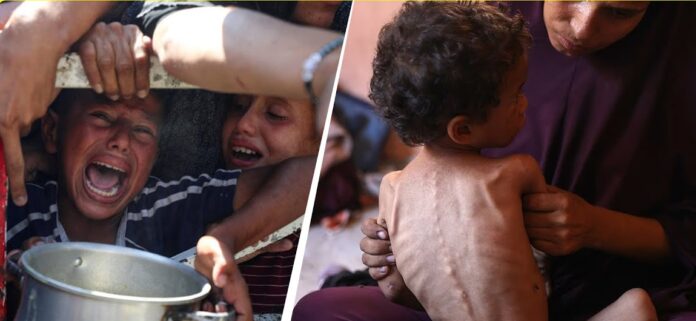Severe malnutrition tripled in Gaza kids; MSF says Israeli blockade has weaponised starvation
A catastrophic hunger crisis is spiralling out of control in Gaza, where severe malnutrition among children under five has tripled in just two weeks at a Médecins Sans Frontières (MSF) clinic in Gaza City. The charity has warned that the humanitarian disaster is deepening as Israel continues to limit aid into the war-ravaged enclave.
MSF, which operates with over 1,000 staff in Gaza, reported a dramatic quadrupling in the number of patients needing malnutrition care at its Gaza City facility since May. In recent screenings, one in four children and pregnant or breastfeeding women were found to be malnourished. Aid groups have accused Israel of using food scarcity as a tool of war, pointing to what they call a “policy of starvation.”
“Israeli authorities’ deliberate use of starvation as a weapon in Gaza has reached unprecedented levels,” MSF said in a scathing statement on Friday. “Patients and healthcare workers themselves are now fighting to survive.”
So far, 122 people in Gaza have died from hunger, with nine more deaths reported within 24 hours. The World Food Programme described the situation as “astonishingly desperate,” stating that nearly a third of Gaza’s population has gone days without eating. An estimated 90,000 women and children are in urgent need of treatment for malnutrition.
The starkest warnings have come from medical workers like Dr Naji al-Qurashali, an obstetrician-gynaecologist, who said that official statistics vastly understate the crisis. He believes half of the hundreds of pregnant women he sees daily are malnourished.
“The malnutrition situation is unimaginable. I never thought I’d see this in my lifetime,” Qurashali said. Miscarriages have surged, and newborns are often disfigured, underweight or premature. In the absence of medical supplies, doctors are forced to use dirty gloves and expired medicines.
“It is incredibly painful,” he added. “I sometimes leave the hospital running because I can’t bear the suffering I can’t fix.”
The international community has come under fire for failing to act. UN Secretary-General António Guterres slammed world leaders on Friday, saying their inaction amid mass starvation in Gaza amounted to a “lack of humanity.” He described the unfolding tragedy not only as a humanitarian crisis but “a moral crisis that challenges the global conscience.”
Pressure is building on political leaders. UK Prime Minister Keir Starmer, French President Emmanuel Macron, and German Chancellor Olaf Scholz issued a joint call for Israel to lift restrictions and allow more humanitarian aid. Macron has pledged to recognise a Palestinian state at the upcoming UN General Assembly in September, while Starmer faces growing domestic pressure to do the same.
Meanwhile, US President Donald Trump dismissed Macron’s announcement as inconsequential, insisting it “won’t change anything.”
As the crisis worsens, aid drops from Jordan and the UAE have been approved by Israel — but these airborne deliveries carry far less than lorries and cost significantly more. Hamas dismissed the operation as a political stunt.
“What Gaza needs is not flying aerobatics,” said Ismail al-Thawabta, spokesman for the Hamas-run media office, “but an open corridor and a steady daily flow of aid trucks.”
For ordinary Gazans like Amal Masri, a 31-year-old pregnant woman, the crisis is a daily battle to stay alive. Food is nearly impossible to find. What she can eat often makes her sick. Her husband, like many others, risks his life searching for aid — often returning empty-handed and injured.
“Most of the time I feel like I’m suffocating, like I’m on the verge of death,” she said.
More than 1,000 Palestinians have reportedly been killed while trying to access food at aid distribution sites. The Gaza Humanitarian Foundation, backed by the US, denies any responsibility for the deadly chaos outside its locations.
Efforts to reach a ceasefire have also faltered. Israel and the US withdrew their negotiators from Qatar on Thursday, effectively halting talks. Trump blamed Hamas, while Hamas insisted it had made reasonable proposals.
“We believe a deal was possible,” said senior Hamas figure Basem Naim. “But Israel lacked the will to reach one.”
As political rhetoric mounts and negotiations collapse, Gaza’s most vulnerable — its children, pregnant women, and the elderly — continue to waste away, waiting for the world to care enough to intervene.
